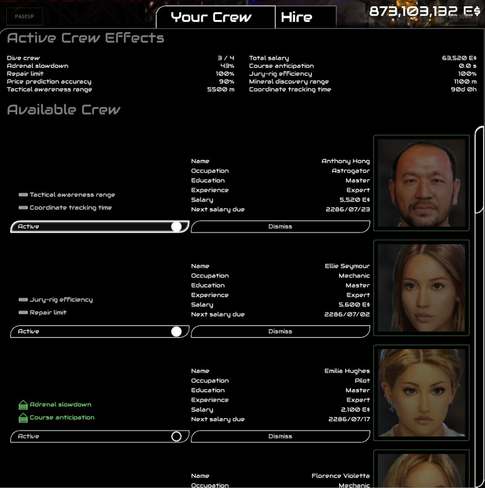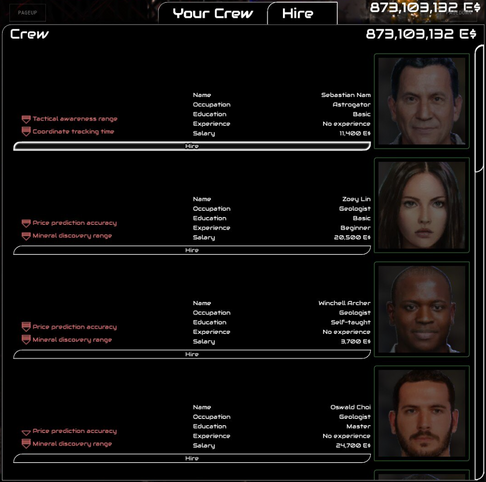Crew help your ship with various functions. Every crew member comes with an associated Agenda. Each crew member has exactly one of the four different professions: Geologist, Astrogator, Mechanic, and Pilot.
Menus
Crew
This menu will let you manage your currently hired crew.
Each crew member will show their name, occupation, education level, experience level, monthly salary, and the in-game date where their salary is due next, alongside their portrait, the button to activate/deactivate them from the current ship, dismiss them from your crew, and if your ship is not full on crew, how their skills affect the general ability they would provide to the ship (red arrows mean they negatively affect it, from a little to a lot, gray means that no stat changes if they are on your ship, and green means they benefit you from your current crew's capabilities.
The top of this menu provides context to the current ship (excluding total salary), including the number of crew active on a ship out of the total able to be placed on it, (from the pilot): the adrenal slowdown percentage & course anticipation, (from the mechanic): the repair limit of parts and the jury-rig efficiency, (from the geologist): the price prediction accuracy and the mineral discovery range, (and from the astrogator): the tactical awareness range and coordinate tracking time. More info on these is provided in each profession's info later down the page.
Hire
This menu is where you go to hire new crew. There is no limit to how many crew you can hire, except of course how capable you are of being able to pay them their salaries.
The information shown here is decently similar to what's shown on the section for your current crew. Do note that the arrows still are compared to who's currently on your ship.
The education and experience stats, albeit just as useful on the Your Crew menu, they become a lot more important when hiring as it affects how much they charge, and is why it is included in this section. These stats are continuous, but the interface only shows "milestones" of skill - for example, if someone's education is shown as "Self-Taught", that may mean an internal education stat anywhere from 0 to 0.25. Each profession has two skills, each scaling with one of the stats. Crew members also have a mostly-hidden Morale stat, which affects their skills.
Some things to consider when hiring crew is what you need and how quickly it's needed. If you cannot afford much, going with a cheaper crew is better, compared to if you need a good crew quick you might have to splurge. One trick used is to hire good crew to train a cheaper one, then get rid of the expensive crew when they are no longer needed. See further below for info on training.
Crew can have a very wide span of wages based on their experience and education, however the minimum possible for each role is listed here:
- pilot: 400
- mechanic: 400
- geologist: 600
- astrogator: 500
Professions
Geologist
Education skill: Price prediction accuracy. Determines accuracy of price prediction by your geologist - both on station in Mineral Market and during ring dive.
Experience skill: Mineral discovery range. Geologist will estimate compositions and prices of minerals within a radius around your ship.
- Without a geologist on board, it's not possible to identify compositions of mineral chunks (except visually - they look differently depending on mineral and purity). This makes them rather essential crew members.
Astrogator
Education skill: Tactical awareness range. Astrogator will highlight ships around you by their transponders.
- Fairly essential to be able to detect threats, derelicts, and other ships outside of visual range.
Experience skill: Coordinate tracking time. The constantly shifting planescape of the rings makes it challenging to trace a specific location. Your astrogator will be able to keep track of them for a limited time.
- Without an astrogator on board, you won't be able to astrogate to waypoints. If at any moment you end up without any astrogators in your employ, you will furthermore lose all saved waypoints. This makes having an astrogator essential.
Mechanic
Education skill: Jury-rig efficiency. Changes how far mechanic can push your ship systems in OMS menu during ringdive.
- Can be very useful, e.g. turning a critical reactor leak that would cause the ship to run out of propellant in seconds into a merely concerning one.
Experience skill: Repair limit. Extends how much your mechanic can repair during maintenance on Enceladus prime station.
- Most equipment is significantly cheaper to repair than to replace (although some isn't), so this allows saving on repairs.
- Note, however, that repairs take more time that replacements, and you'll have to pay for crew wages and hotels in the meantime, which for large and skilled crews may be more expensive than the repair savings.
Pilot
Education skill: Adrenal slowdown. When in danger, pilot's perception of time will slow down.
- Available even without a pilot, albeit only a small slowdown.
Experience skill: Course anticipation. Pilot will predict the course of your ship and all surrounding objects to determine if ship is in danger of collision.
- This automatically enables adrenal slowdown if a collision is predicted to happen in that time, given the current velocity.
- Often toggles unnecessarily.
Training
With time spent in your crew, crew members gradually improve. Education is improved both by spending time on Enceladus as well as within the rings, whereas doing profession-specific actions during dives increases Experience. The more advanced in a skill a crew member is, the slower they progress further.
The only thing that accelerates learning is having another crewmember of the same profession, who is better in the relevant skill, tutor them. The gain is determined by the difference of their skills, but caps at 2x the normal learning rate - so in total, a crewmember can learn at most at trice the normal learning rate (if they are completely unskilled and tutored by someone perfect).
Education
The formula for education is as follows: if the current Education (which goes from 0 to 1) is y, then the gain per day is
y' * 1day = (1-y)/400 + (A-y)/200
where A is the highest Education level among crewmembers with the same profession (so if there's nobody better, then A=y and that term is zero).
Without tutoring, the solution to this differential equation is y(t) = 1 - (1-y(0))*exp(-t/(400*day)). So the Education level exponentially decays towards perfection, with a characteristic time of 400 days. For example, it takes 115 days for an initially completely unskilled crewmember to reach the first milestone of 0.25.
Experience
The formula for rate of skill gain is the same for Experience as for Education. However, instead of being per day of time, Experience experience is gained by going actions. If there are multiple crewmembers with the same occupation on the ship, all of them gain the full experience amount.
The actions are as follows:
- Geologists: identifying mineral chunks, depending on value (1 day per 60 000 E$ of value)
- Astrogators: detecting ships (seems to be 2 days per ship detected); discovering points of interest
- Mechanics: repairing or replacing parts (1 day's worth per 4 hours spent doing that)
- Pilot: evading collisions (per unit of time flying the ship while under the pilot's automatic adrenaline)
- Entire crew: flying through the rings at more than 50 m/s (0.5 days per minute).
Multiple Crew of Same Profession
Having multiple crew of the same profession on a ship can provide additional benefits besides the tutoring mentioned earlier, which will happen anywhere.
Aiding In a Job
Having multiple crew of the same profession can assist with the speed and/or effective capability of the task at hand.
- Geologists will identify
nmineral chunks at a time, where n is the number of geologists - Astrogators will have a greater ship identification range and will do so faster
- Mechanics will lower the amount of time to repair/replace equipment (only affects at the time of repair, counts every mechanic you have instead of who's on board)
Spare Crew
Crew may be unable to continue doing their job in the rings with a multitude of causes. From this, if a task is necessary enough for you not to want to take risks, having extra crew may hold additional benefits. Geologists and astrogators especially benefit from the extra help, as they can seriously hamper a dive and may cause an early return.
| Incapacitated how? | Cause |
|---|---|
| Injured themselves | When attempting to salvage a derelict with a crewmember, there's a chance of failure and the crew can injure themselves. This may not always be the case after a failed attempt. |
| Piloting ship | After a successful salvage using a crewmember, they will need to pilot the ship back to Enceladus Prime, and cannot remotely do their job |
| Singing Job | If you have a singer onboard, they may request to take some leave to perform a job. It is recommended to let them do it as they may leave your crew otherwise. |
Morale
Morale is a hidden stat of each crew member, and goes from -0.5 to 0.5. Morale is shown directly at Enceladus when its absolute value is more than 0.3, by happy/sad icons on the crew members in question.
Usually, morale gradually decays to 0 over time. Good accommodations (good hotels for the time on the station, or particularly comfortable ships like the OCP-209 or the Peacock Prospector for the time spent in dives) or bad ones (like the Vulture Prospector) change this point of stability. Some services, like good hotels or The Twins, also have an instant effect on morale. Purchasing drinks in the rings from dedicated suppliers will also positively affect morale for any crew currently on your ship.
Some Agenda events may affect morale. Also, not paying a crew member's wages will cause their morale to rapidly decrease.
Morale modifies the value of skills as modified = original^(1-morale). This only applies to the effects of skills, and not to training (happier crew members don't learn or teach faster). The effects of morale are more significant for low skill levels. For example, morale of 0.3 increases a base skill of 0.25 to 0.37, but a base skill of 0.75 only to 0.81.


